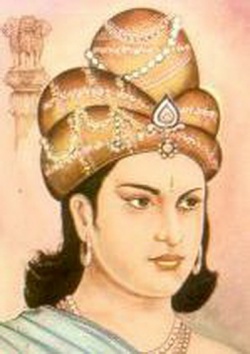Difference between revisions of "Aśoka"
m (Text replacement - "abroad" to "abroad") |
|||
| Line 1: | Line 1: | ||
[[File:Asoka.jpg|thumb|250px|]] | [[File:Asoka.jpg|thumb|250px|]] | ||
| − | [[Aśoka]] was the third [[emperor]] of the {{Wiki|Mauryan}} Dynasty and ruled [[India]] from 268 to 239 BCE. Shocked by the destruction he had [[caused]] by his [[war]] with Kāliṅga, [[Aśoka]] converted to [[Buddhism]], and spent the remainder of his reign trying to govern his vast [[realm]] by [[spiritual]] {{Wiki|principles}}. He renounced an aggressive foreign policy, promoted [[religious]] [[harmony]], established hospitals, humanized the judicial system and sent [[Buddhist]] [[missionaries]] throughout [[India]] and | + | [[Aśoka]] was the third [[emperor]] of the {{Wiki|Mauryan}} Dynasty and ruled [[India]] from 268 to 239 BCE. Shocked by the destruction he had [[caused]] by his [[war]] with Kāliṅga, [[Aśoka]] converted to [[Buddhism]], and spent the remainder of his reign trying to govern his vast [[realm]] by [[spiritual]] {{Wiki|principles}}. He renounced an aggressive foreign policy, promoted [[religious]] [[harmony]], established hospitals, humanized the judicial system and sent [[Buddhist]] [[missionaries]] throughout [[India]] and abroad. It was primarily because of Aśoka’s {{Wiki|patronage}}, that [[Buddhism]] became an India-wide [[religion]] as quickly as it did. To make known his various reforms, [[Aśoka]] issued a series of edicts, and had them inscribed on rocks and huge stone pillars, which were set up all over [[India]]. These edicts are the earliest decipherable written records from {{Wiki|ancient India}}. |
The Edicts of [[King]] [[Asoka]], S. Dhammika,1993. | The Edicts of [[King]] [[Asoka]], S. Dhammika,1993. | ||
Revision as of 10:41, 30 September 2013
Aśoka was the third emperor of the Mauryan Dynasty and ruled India from 268 to 239 BCE. Shocked by the destruction he had caused by his war with Kāliṅga, Aśoka converted to Buddhism, and spent the remainder of his reign trying to govern his vast realm by spiritual principles. He renounced an aggressive foreign policy, promoted religious harmony, established hospitals, humanized the judicial system and sent Buddhist missionaries throughout India and abroad. It was primarily because of Aśoka’s patronage, that Buddhism became an India-wide religion as quickly as it did. To make known his various reforms, Aśoka issued a series of edicts, and had them inscribed on rocks and huge stone pillars, which were set up all over India. These edicts are the earliest decipherable written records from ancient India.
The Edicts of King Asoka, S. Dhammika,1993.
